Kateryna Stepanenko, Karolina Hird, Angelica Evans, Christina Harward, and Mason Clark
The Kremlin is already and will likely continue to exploit the Hamas attacks in Israel to advance several information operations intended to reduce US and Western support and attention to Ukraine. The Kremlin amplified several information operations following Hamas attacks in Israel on October 7, primarily blaming the West for neglecting conflicts in the Middle East in favor of supporting Ukraine and claiming the international community will cease to pay attention to Ukraine by portraying attention to the Middle East or alternatively Ukraine as a zero-sum comparison. Deputy Chairman of the Russian Security Council Dmitry Medvedev claimed the United States and its allies should have been “busy with” working on “Palestinian-Israeli settlement” rather than “interfering” with Russia and providing Ukraine with military aid.[1] The Russian Ministry of Foreign Affairs (MFA) accused the West of blocking efforts by a necessary “quartet” of Russia, the US, the European Union, and the United Nations, leading to an escalation in violence, implicitly blaming the West for the current fighting.[2] Prominent Russian propagandist Sergei Mardan directly stated that Russia will benefit from the escalation as the world “will take its mind off Ukraine for a while and get busy once again putting out the eternal fire in the Middle East.”[3] These Kremlin narratives target Western audiences to drive a wedge in military support for Ukraine, seek to demoralize Ukrainian society by claiming Ukraine will lose international support, and intend to reassure Russian domestic audiences that the international society will ignore Ukraine’s war effort.
Several key sources within the Russian information space shifted the focus of their daily coverage to the situation in Israel on October 7, which may impact the information environment around the war in Ukraine in the coming days or weeks. Many Russian milbloggers focused largely on the Hamas attacks in Israel on October 7, and some promoted Kremlin information operations by claiming that the West’s attention has shifted away from Ukraine and towards Israel.[4] This focus on Israel even prompted one Russian milblogger to urge others to not “forget” about the war in Ukraine.[5] ISW cannot forecast at this time how the source environment will change as the Hamas attacks in Israel unfold but will provide clear updates on any impact on ISW’s ability to collect from Russian milbloggers and geolocation sources, and subsequent effects on the detail available ISW can provide in these daily assessments.
Ukrainian forces continued offensive operations near Bakhmut and in western Zaporizhia Oblast on October 7 and reportedly advanced in both directions. The Ukrainian General Staff reported that Ukrainian forces were partially successful east of Andriivka (8km southwest of Bakhmut).[6] Ukrainian Eastern Group of Forces Spokesperson Captain Ilya Yevlash noted that Ukrainian forces have advanced from 100 to 300 meters in different directions near Bakhmut over the past day.[7] Ukrainian military sources additionally stated that Ukrainian forces advanced in western Zaporizhia Oblast in the areas north of Kopani (5km northwest of Robotyne) and north of Novoprokopivka (2km south of Robotyne).[8]
Russian forces conducted a series of missile strikes targeting Ukrainian rear areas and port infrastructure on the night of October 6-7. Ukrainian sources, including the Ukrainian Southern Operational Command, reported that Russian forces launched Onyx cruise missiles from occupied Crimea at Chernomorsk, Odesa Oblast; and Poltava Oblast Head Dmytro Lunin stated that Russian forces conducted a missile strike on Myrhorod, Poltava Oblast.[9] The Ukrainian General Staff reported that the Russian strikes damaged a granary, residential buildings, educational buildings, and other civil infrastructure.[10]
The Russian government approved legislation temporarily restricting the border checkpoints that Ukrainian citizens can use to enter Russia from third countries, likely focused on Belarus and the Baltic States, likely in response to continued concern over the security of Russian border regions and possible Ukrainian infiltration efforts. Russian media reported on October 6 that the legislation states that Ukrainian citizens 14 years old and above can only enter Russia from third countries through the Ludonka automotive checkpoint in Pskov Oblast (bordering Latvia) and Sheremetyevo airport in Moscow Oblast beginning on October 16.[11] The legislation does not apply to Ukrainian citizens traveling from occupied Donetsk, Luhansk, Zaporizhia, and Kherson oblasts or Ukrainian citizens under the age of 14 traveling without a legal guardian. This decision is reportedly aimed at “ensuring the safety” of Russian citizens.
Belarusian officials are leveraging international partnerships in an attempt to legitimize Belarus’ role in the illegal deportation of Ukrainian children. Russian and Belarusian media reported on October 4 that a number of diplomats who are accredited in Belarus visited a group of 44 children from Lysychansk and Severodonetsk at an accommodation point in Novopolotsk, Belarus.[12] The group of diplomats included representatives from Zimbabwe, India, Qatar, China, Cuba, Mongolia, the United Arab Emirates, Palestine, Russia, Syria, and the Commonwealth of Independent States (CIS).[13] Russian and Belarusian media reported that Belarusian officials showed the diplomats the dormitory where the children are located and talked about the educational and medical services provided to the children. ISW has previously reported that Belarus has been closely involved in Russia’s efforts to forcibly deport Ukrainian children from their homes, and the European Parliament adopted a resolution reflective of this fact on September 13 that recognizes Belarusian dictator Alexander Lukashenko as complicit in crimes involving the deportation of Ukrainian children to Belarus and the Russian Federation.[14] Belarusian authorities likely hosted the delegation in an effort to portray its actions vis a vis Ukrainian children as somehow legitimate and legal, as many of the diplomats made positive statements about the accommodations and experiences of the children in Belarus.
Russian “Vostok” Battalion Commander Alexander Khodakovsky stated that Russian “patriotic” communities remain vulnerable to division due to Russian officials’ failure to consolidate society, particularly after Wagner Group financier Yevgeny Prigozhin’s June 24 rebellion.[15] Khodakovsky argued that Russia must consolidate its society to achieve a common goal for the war – a goal that he claimed that Russian society does not have a good understanding of. Khodakovsky argued that the fact that Prigozhin remains in people’s heads despite his disappearance from the public eye after his rebellion demonstrates that Russian elites do not care much about the need to consolidate society. Khodakovsky concluded that there are and will be “provocative injections” into the Russian ultranationalist space that aim to break the patriotic environment by stirring up contradictions to slow and complicate the war effort. Khodakovsky added that these provocations also aim to make post-war Russian society unstable. Khodakovsky was likely reacting to discussions in the Russian information space following Russian President Vladimir Putin’s mention of Prigozhin at the Valdai Discussion Club on October 5, and his response likely indicates that Russian society continues to be influenced by Prigozhin despite his death on August 23.[16]
Chechen Republic Head Ramzan Kadyrov awarded his son, Adam Kadyrov, the title of “Hero of the Chechen Republic” on October 7 despite recent controversy after Ramzan Kadyrov posted footage of Adam beating a detainee.[17] Russian State Duma Deputy Adam Delimkhanov, Adam Kadyrov’s godfather, praised Adam for being a “shining example” of competence and education and a purposeful young man.[18] Ramzan Kadyrov also notably appointed his daughter, Aishat Kadyrova, Chechen Deputy Prime Minister for Social Issues on October 2.[19] Both instances came after prominent members of the Russian Human Rights Council called for an investigation into Adam Kadyrov for the beating.[20]
The Russian Ministry of Defense (MoD) highlighted the production of the Sarmat intercontinental ballistic missile (ICBM) on October 7, supporting Russian President Vladimir Putin’s statements about successful tests of the missile on October 5 as part of a continued nuclear brinkmanship information operation. The Russian MoD published footage of Russian Defense Minister Sergei Shoigu visiting the Krasnoyarsk Machine-Building Plant and inspecting the production process of the Sarmat ICBM.[21] Shoigu claimed that the Russian Strategic Missile Force would be re-equipped with the Sarmat missile system. ISW previously assessed that the Kremlin and Russian MoD use nuclear rhetoric to prompt the United States and its allies to pressure Ukraine to negotiate and that Russian nuclear use in Ukraine remains unlikely.[22]
Key Takeaways:
- The Kremlin is already and will likely continue to exploit the Hamas attacks in Israel to advance several information operations intended to reduce US and Western support and attention to Ukraine.
- Several key sources within the Russian information space shifted the focus of their daily coverage to the situation in Israel on October 7, which may impact the information environment around the war in Ukraine in the coming days or weeks.
- Ukrainian forces continued offensive operations near Bakhmut and in western Zaporizhia Oblast on October 7 and reportedly advanced in both directions.
- Russian forces conducted a series of missile strikes targeting Ukrainian rear areas and port infrastructure on the night of October 6-7.
- The Russian government approved legislation temporarily restricting the border checkpoints that Ukrainian citizens can use to enter Russia from third countries, likely focused on Belarus and the Baltic States, likely in response to continued concern over the security of Russian border regions and possible Ukrainian infiltration efforts.
- Belarusian officials are leveraging international partnerships in an attempt to legitimize Belarus’ role in the illegal deportation of Ukrainian children.
- Russian “Vostok” Battalion Commander Alexander Khodakovsky stated that Russian “patriotic” communities remain vulnerable to division due to Russian officials’ failure to consolidate society, particularly after Wagner Group financier Yevgeny Prigozhin’s June 24 rebellion.
- The Russian MoD highlighted the production of the Sarmat intercontinental ballistic missile (ICBM) on October 7, supporting Russian President Vladimir Putin’s statements about successful tests of the missile on October 5 as part of a continued nuclear brinkmanship information operation.
- Russian forces conducted offensive operations along the Kupyansk-Svatove-Kreminna line, near Bakhmut, along the Avdiivka-Donetsk City line, in western Donetsk Oblast, in the western Donetsk-eastern Zaporizhia Oblast border area, and in western Zaporizhia Oblast and reportedly advanced in some areas on October 7.
- Ukrainian partisan activity reportedly killed a United Russia official in occupied Kherson Oblast.
We do not report in detail on Russian war crimes because these activities are well-covered in Western media and do not directly affect the military operations we are assessing and forecasting. We will continue to evaluate and report on the effects of these criminal activities on the Ukrainian military and the Ukrainian population and specifically on combat in Ukrainian urban areas. We utterly condemn these Russian violations of the laws of armed conflict, Geneva Conventions, and humanity even though we do not describe them in these reports.
- Russian Main Effort – Eastern Ukraine (comprised of two subordinate main efforts)
- Russian Subordinate Main Effort #1 – Capture the remainder of Luhansk Oblast and push westward into eastern Kharkiv Oblast and encircle northern Donetsk Oblast
- Russian Subordinate Main Effort #2 – Capture the entirety of Donetsk Oblast
- Russian Supporting Effort – Southern Axis
- Russian Mobilization and Force Generation Efforts
Activities in Russian-occupied areas
Russian Main Effort – Eastern Ukraine
Russian Subordinate Main Effort #1 – Luhansk Oblast (Russian objective: Capture the remainder of Luhansk Oblast and push westward into eastern Kharkiv Oblast and northern Donetsk Oblast)
Russian forces continued offensive operations along the Kupyansk-Svatove-Kreminna line on October 7 and reportedly advanced. A Russian milblogger amplified a claim that Russian forces advanced up to 1km near Yahidne (22km southeast of Kupyansk) on October 6.[23] A Russian news aggregator claimed that Russian forces also advanced near Synkivka (8km northeast of Kupyansk), Ivanivka (20km southeast of Kupyansk), and Kotlyarivka (22km southeast of Kupyansk).[24] The Russian “Storm Ossetia” and “Alania” volunteer battalions claimed that Russian forces advanced up to 500m in the Kupyansk direction.[25] The Ukrainian General Staff reported on October 7 that Russian forces conducted unsuccessful attacks near Synkivka and Ivanivka in Kharkiv Oblast and Makiivka in Luhansk Oblast (60km southwest of Kupyansk and about 22km northwest of Kreminna).[26] A Russian milblogger claimed that Russian forces conducted a “massive” offensive in the Kupyansk and Lyman directions.[27] Russian milbloggers claimed that Russian forces conducted offensive operations near Synkivka and Makiivka.[28] A Russian milblogger claimed on October 6 that Russian forces continue to strike crossings across the Oskil River in the Kupyansk direction.[29]
A Ukrainian military observer provided additional details on the Russian units operating in the Kupyansk direction on October 7. The observer stated that elements of the Russian 79th Motorized Rifle Regiment (18th Guards Motor Rifle Division, 11th Army Corps, Baltic Fleet) began moving closer to the front line east of Ivanivka (28km northeast of Kupyansk) and Velyky Vyselok (23km northeast of Kupyansk).[30] The observer stated that the Russian 11th Army Corps (Baltic Fleet) makes up the bulk of the Russian Western Grouping of Forces’ reserve forces in the Kupyansk direction. The observer added that Russian military command has deployed at least two unspecified combined tactical detachments with forces of up to a battalion each, which consist of “Storm-Z” companies. The observer stated that Russian forces have also concentrated elements of the Russian 448th Missile Brigade (20th Guards Combined Arms Army [CAA], Western Military District), 9th Guards Artillery Brigade (6th CAA, Western Military District), 45th High-Power Artillery Brigade (Western Military District), 244th Artillery Brigade (11th Army Corps, Baltic Fleet), 288th Artillery Brigade (1st Guards Tank Army, Western Military District), and 147th Guards Self-Propelled Artillery Regiment (2nd Guards Motor Rifle Division, 1st Guards Tank Army, Western Military District) in this direction. The observer added that elements of the Russian 138th Motorized Rifle Brigade (6th CAA, Western Military District), 1st Guards Motor Rifle Regiment (2nd Guards Motor Rifle Division, 1st Guards Tank Army, Western Military District), and 15th Motorized Rifle Regiment (2nd Guards CAA, Central Military District) will likely participate in the next Russian attack in the direction of Kupyansk.
Russian sources claimed that Ukrainian forces conducted unsuccessful attacks along the Kupyansk-Svatove-Kreminna line on October 7. The Russian MoD claimed that Russian forces repelled Ukrainian attacks near Lyman Pershyi (11km northeast of Kupyansk) in Kharkiv Oblast, Makiivka and Dibrova (6km southwest of Kreminna) in Luhansk Oblast, Torske (15km west of Kreminna) in Donetsk Oblast, and the Serebryanske forest area.[31] A Russian milblogger denied claims that Ukrainian forces advanced into Hryanykivka (16km northeast of Kupyansk).[32] Russian milbloggers claimed that Ukrainian forces unsuccessfully attacked near Yampolivka (17km west of Kreminna), Dibrova, and Kuzmyne (3km southwest of Kreminna).[33]
Russian Subordinate Main Effort #2 – Donetsk Oblast (Russian objective: Capture the entirety of Donetsk Oblast, the claimed territory of Russia’s proxies in Donbas)
Ukrainian forces continued offensive operations in the Bakhmut direction on October 7 and reportedly advanced east of Andriivka (8km southwest of Bakhmut).[34] The Ukrainian General Staff reported that Ukrainian forces achieved partial success east of Andriivka, and Ukrainian Eastern Group of Forces Spokesperson Captain Ilya Yevlash stated that Ukrainian forces managed to advance in different directions around Bakhmut by 100 to 300 meters over the past day.[35] Russian milbloggers claimed that Ukrainian forces continued unsuccessful efforts to break through Russian defenses near the railway line east of Andriivka and Klishchiivka (6km southwest of Bakhmut).[36]
Russian forces continued to counterattack near Bakhmut on October 7, but did not make any confirmed territorial gains. Yevlash and the Ukrainian General Staff stated that Russian forces unsuccessfully attempted to regain lost positions south of Andriivka.[37] A Kremlin-affiliated milblogger claimed that Russian forces counterattacked near Andriivka.[38] A Russian milblogger claimed that the Russian forces that are operating on separate frontline sectors near Klishchiivka are facing difficulties due to issues with communications equipment, reinforcements, and a lack of timely reports on the realistic situation on the battlefield.[39] The milblogger added that on the contrary, some other Russian units claim that they are able to hold their defenses but are ”suffering” because they have to create paper reports on spent ammunition.
Russian forces continued offensive operations on the Avdiivka-Donetsk City line on October 7 and reportedly advanced in Marinka (on the southwestern outskirts of Donetsk City).[40] A Kremlin-affiliated milblogger claimed that Russian forces attacked near Novomykhailivka (10km southwest of Donetsk City) and Marinka, and slightly advanced in Marinka after a long period of positional battles.[41] The milblogger also claimed that Russian forces unsuccessfully attacked the southern approaches to Avdiivka and conducted reconnaissance-in-force near Druzhba (likely referring to a settlement 10km northwest of Horlivka, which is northeast of the Donetsk City area) to open a new area of hostilities.[42] A Russian news aggregator claimed that Russian forces resumed offensive operations near Krasnohorivka (5km west of Donetsk City) and that fighting is ongoing on Marinka’s western outskirts.[43] The Ukrainian General Staff reported that Ukrainian forces repelled Russian assaults near Avdiivka, Pervomaiske (7km northwest of Donetsk City), Marinka, Krasnohorivka, and Novomykhailivka.[44]
Russian Supporting Effort – Southern Axis (Russian objective: Maintain frontline positions and secure rear areas against Ukrainian strikes)
Russian sources claimed that Ukrainian forces conducted ground attacks in the western Donetsk Oblast and the Donetsk-Zaporizhia Oblast border area on October 7 but did not advance. One Russian milblogger claimed that a Ukrainian infantry platoon and two infantry fighting vehicles attempted to attack north of Mykilske (3km southeast of Vuhledar and about 30km southeast of Velyka Novosilka).[45] The Russian MoD claimed that elements of the Russian Eastern Grouping of Forces repelled three Ukrainian attacks near Pryyutne (15km southwest of Velyka Novosilka).[46] Russian milbloggers discussed purported Ukrainian attacks and continued fighting near Urozhaine (10km south of Velyka Novosilka), west of Staromayorske (10km south of Velyka Novosilka), and west of Novodonetske (13km southeast of Velyka Novosilka).[47]
Russian forces conducted counterattacks in western Donetsk Oblast and in the Donetsk-Zaporizhia Oblast border area on October 7 but did not make any confirmed advances. The Ukrainian General Staff reported that Ukrainian forces repelled Russian attacks in the western Donetsk Oblast near Vuhledar and Vodyane (6km northeast of Vuhledar) and in the Donetsk-Zaporizhia Oblast border area near Zolota Nyva (12km southeast of Velyka Novosilka), Staromayorske, and Pryyutne.[48] A Russian milblogger claimed that Russian forces have regained the initiative in this area and counterattacked from positions in Novodonetske (12km southeast of Velyka Novosilka) and Mykilske.[49] Russian sources amplified reports that the 34th Motorized Rifle Brigade (49th Combined Arms Army, Southern Military District) and elements of the 5th Combined Arms Army (Eastern Military District) are fighting in the area south of Velyka Novosilka.[50]
Ukrainian forces continued offensive operations in western Zaporizhia Oblast on October 7 and reportedly advanced. Ukrainian military sources reported that Ukrainian forces were partially successful north of Kopani (5km northwest of Robotyne) and north of Novoprokopivka (2km south of Robotyne).[51] Russian milbloggers claimed that fighting has intensified along the Robotyne-Verbove line after Ukrainian forces restarted attacks northwest of Verbove.[52] Some Russian milbloggers reported that Ukrainian forces also conducted limited attacks north of Novoprokopivka and generally classified the situation south of Orikhiv as complicated and tense.[53]
Russian forces conducted limited counterattacks in western Zaporizhia Oblast on October 7 but did not make any confirmed advances. The Ukrainian General Staff reported that Ukrainian forces are holding back Russian attacks northeast of Novoprokopivka.[54] Russian sources claimed that Russian forces conducted several counterattacks near Verbove and west of Robotyne.[55]
Russian milbloggers continued to voice concern over potential Ukrainian operations in Kherson Oblast. Several Russian sources claimed that Ukrainian forces are deploying naval infantry elements to the Kherson Oblast front to prepare to establish positions in the Dnipro River Delta.[56]
Ukraine reportedly launched a drone and missile strike against Russian infrastructure in occupied Crimea on October 6-7. The Russian MoD claimed that Russian air defenses detected and destroyed a Ukrainian drone 10km from the southwestern coast of occupied Crimea on the night of October 6.[57] The Russian MoD also claimed that Russian air defense forces downed a Ukrainian S-200 surface-to-air missile over Crimea on the evening of October 7.[58] Russian sources reported that air defenses were activated over Dzhankoi.[59] A Ukrainian military observer noted that the Russian military command has regrouped air defense forces and assets in occupied Crimea in order to better implement comprehensive control of the air, surface, and maritime situation in the Black Sea region.[60]
Satellite imagery confirms that the Russian Black Sea Fleet (BSF) maintains a substantial presence in Sevastopol.[61] Imagery from October 6 shows that there are two Krivak-class frigates, a patrol ship, two corvettes, three Ropucha-class landing ships, one Kilo-class submarine, two intelligence ships, and two repair vessels at the dock in Sevastopol.
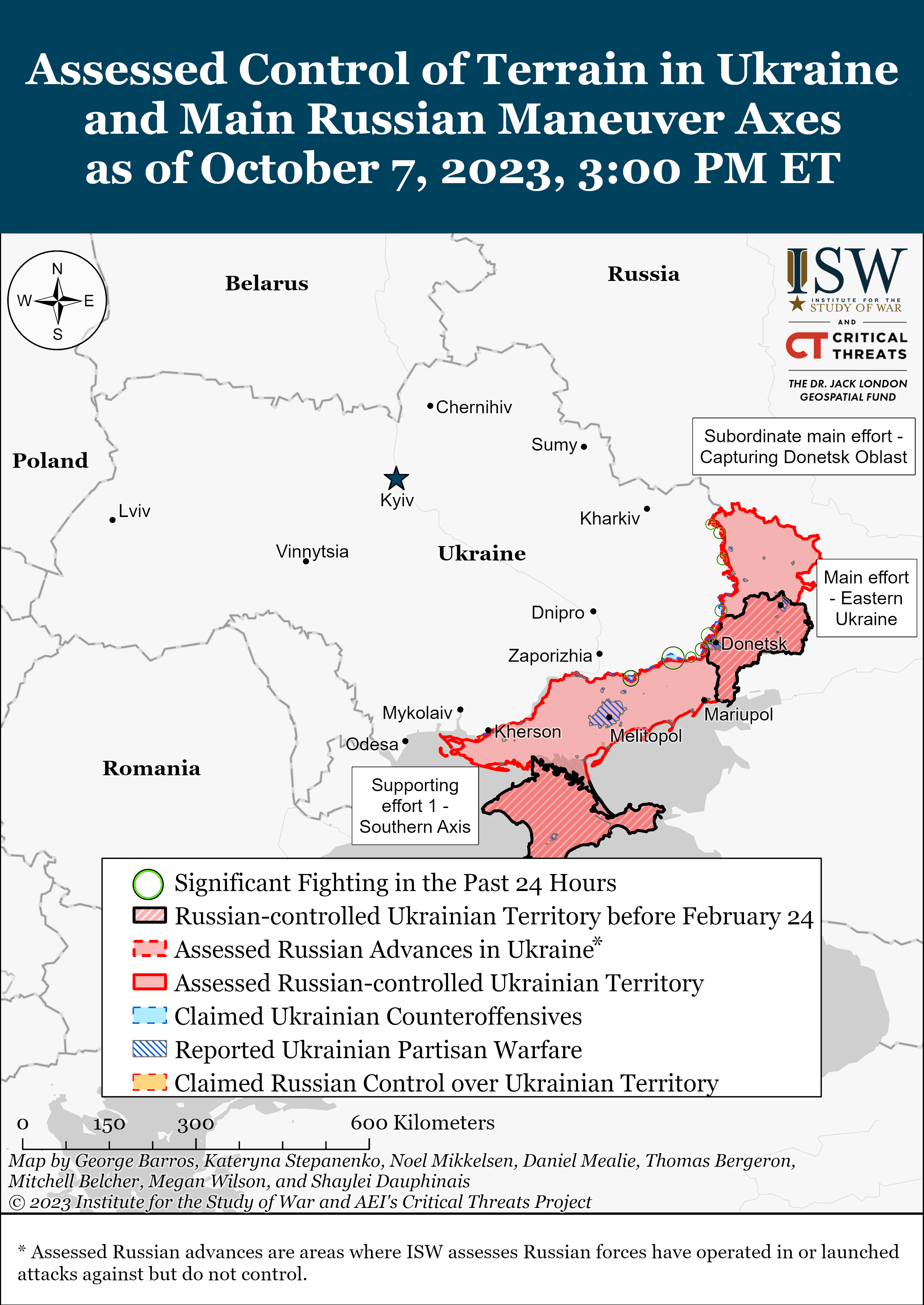
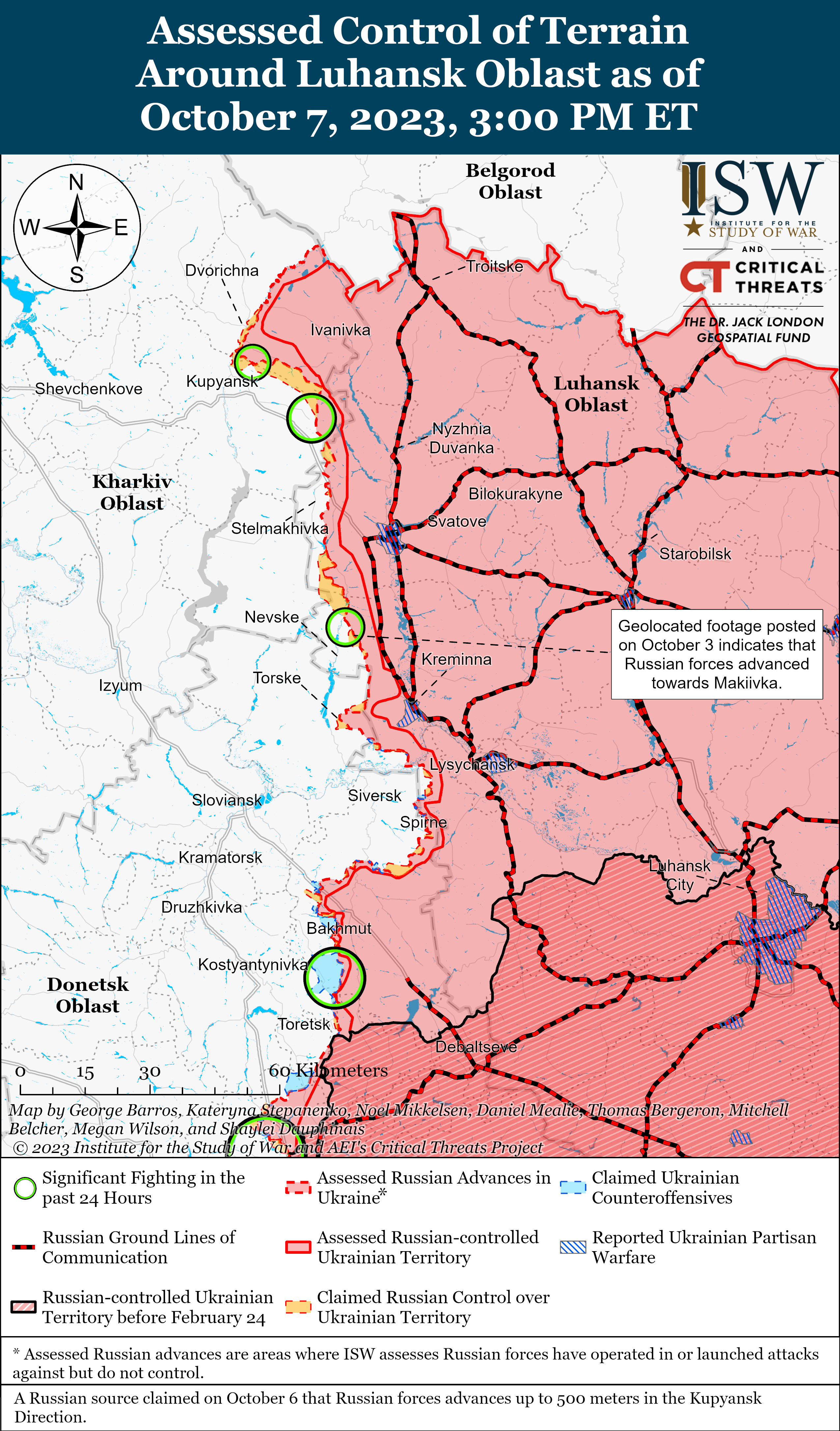
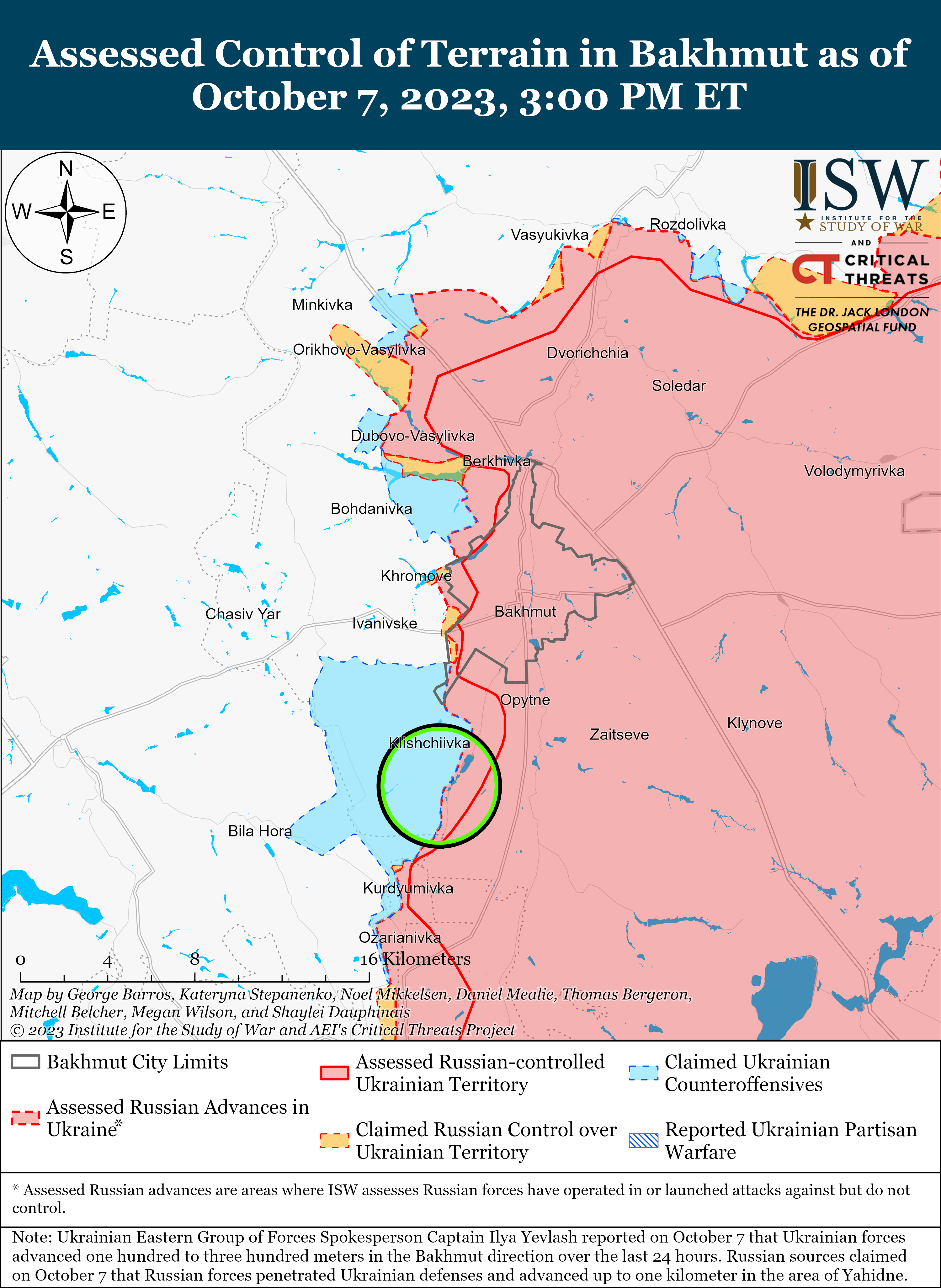
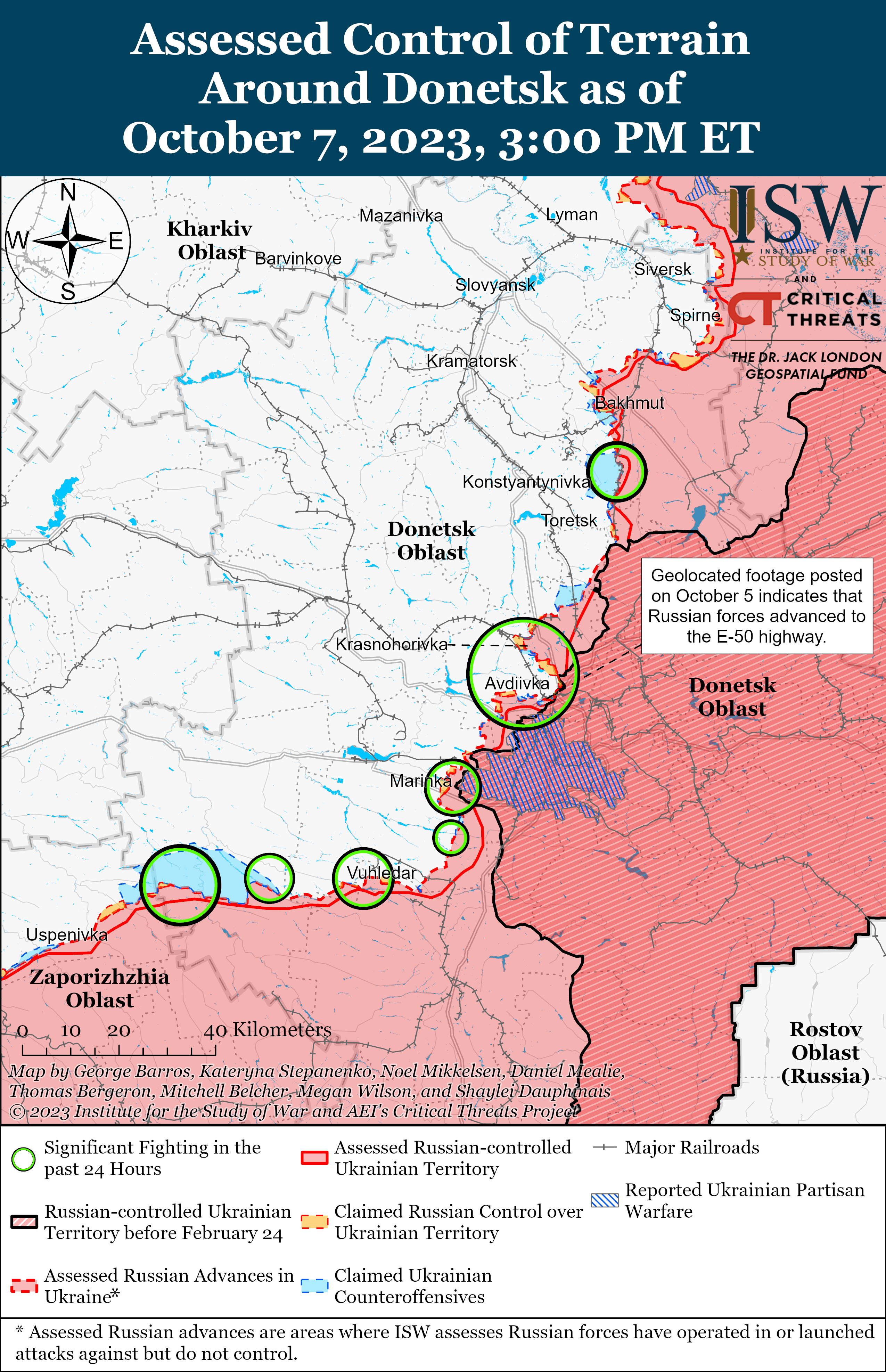
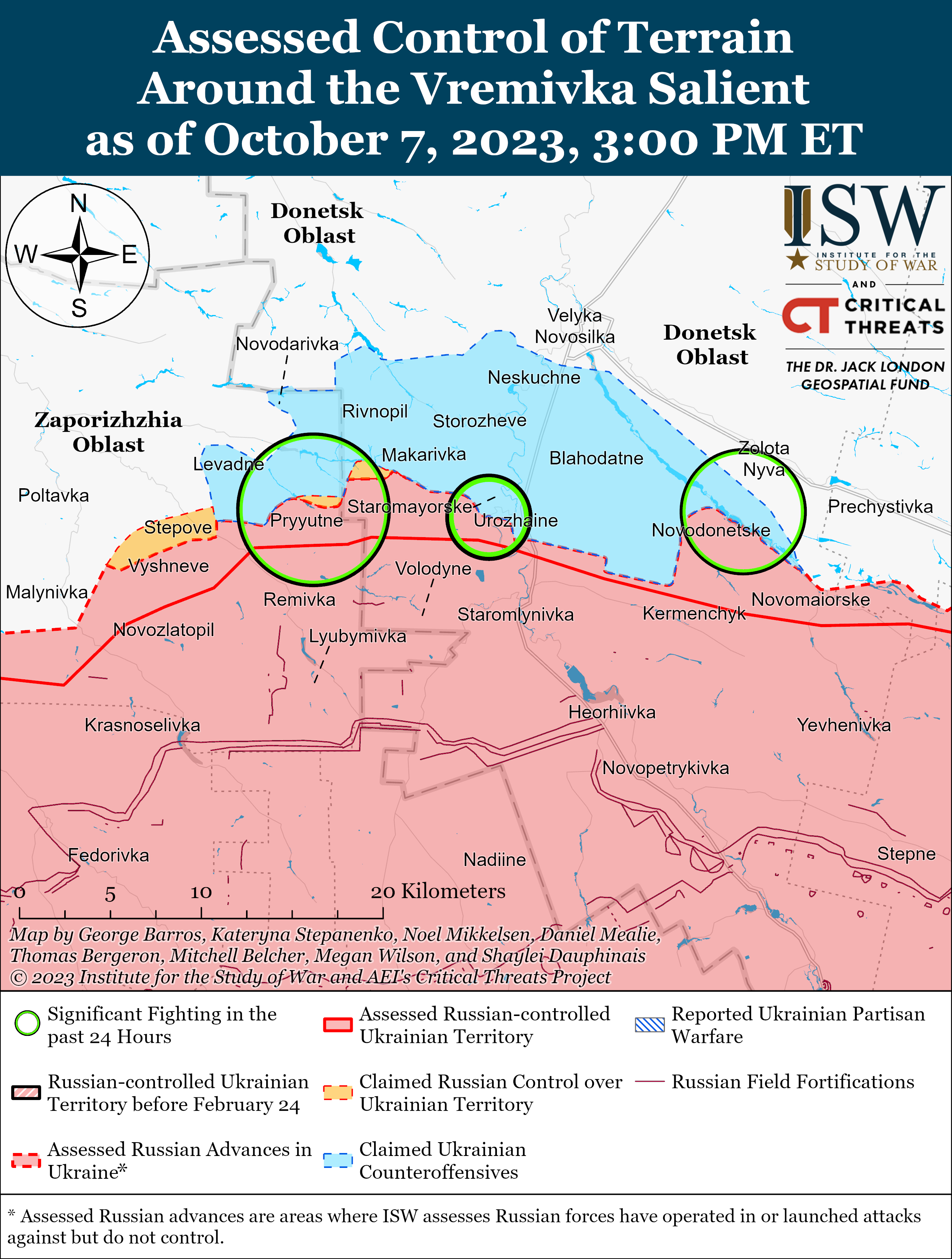
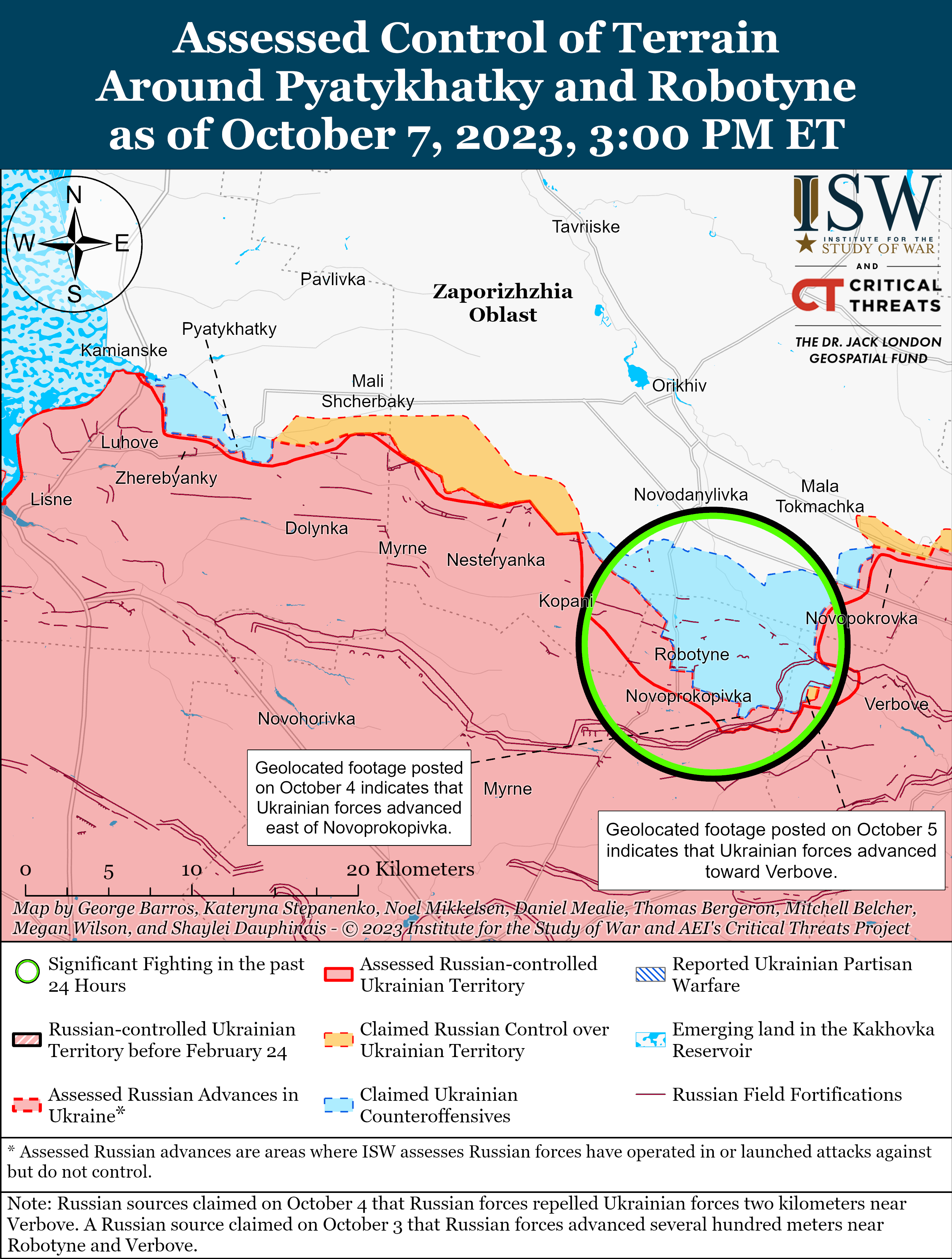
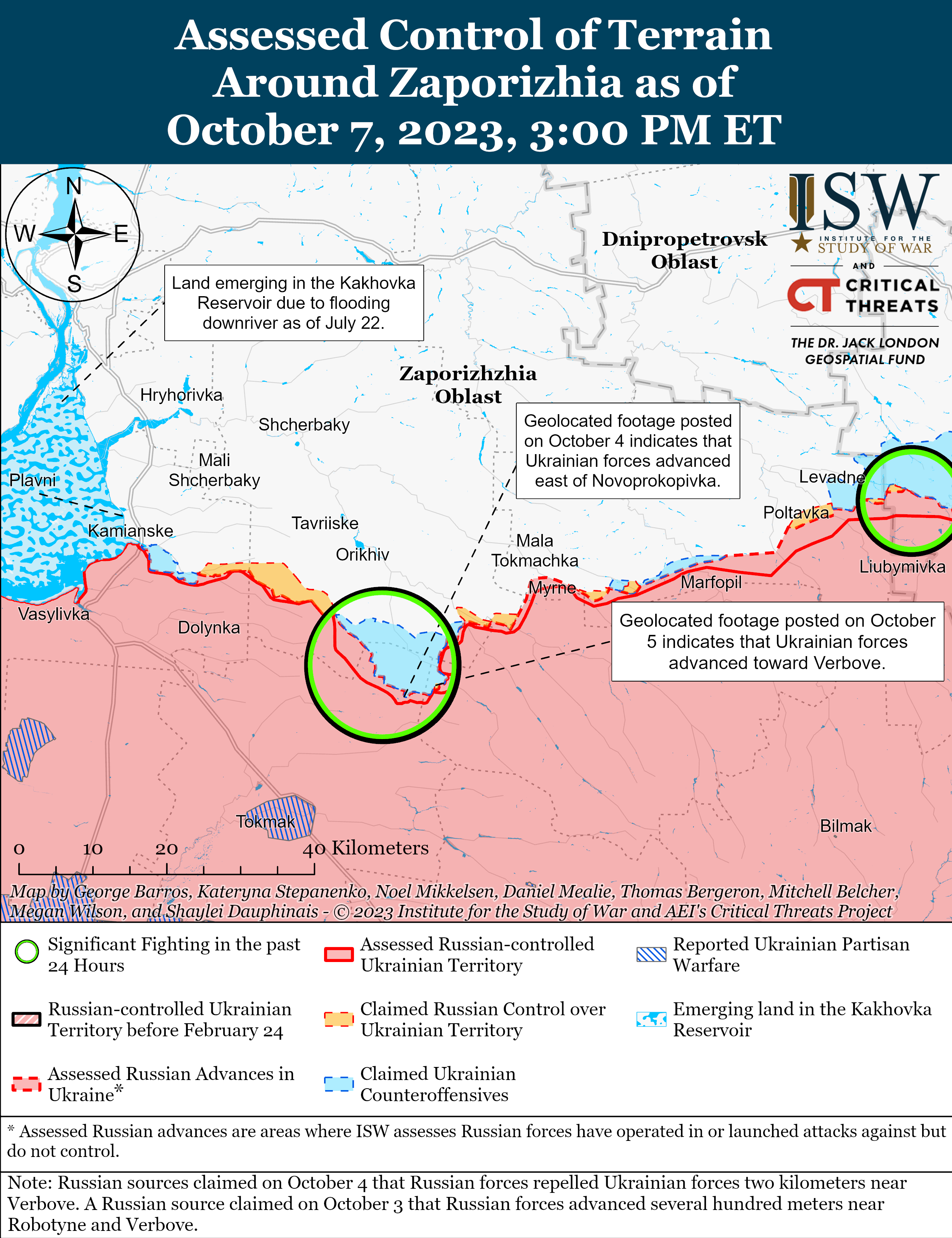
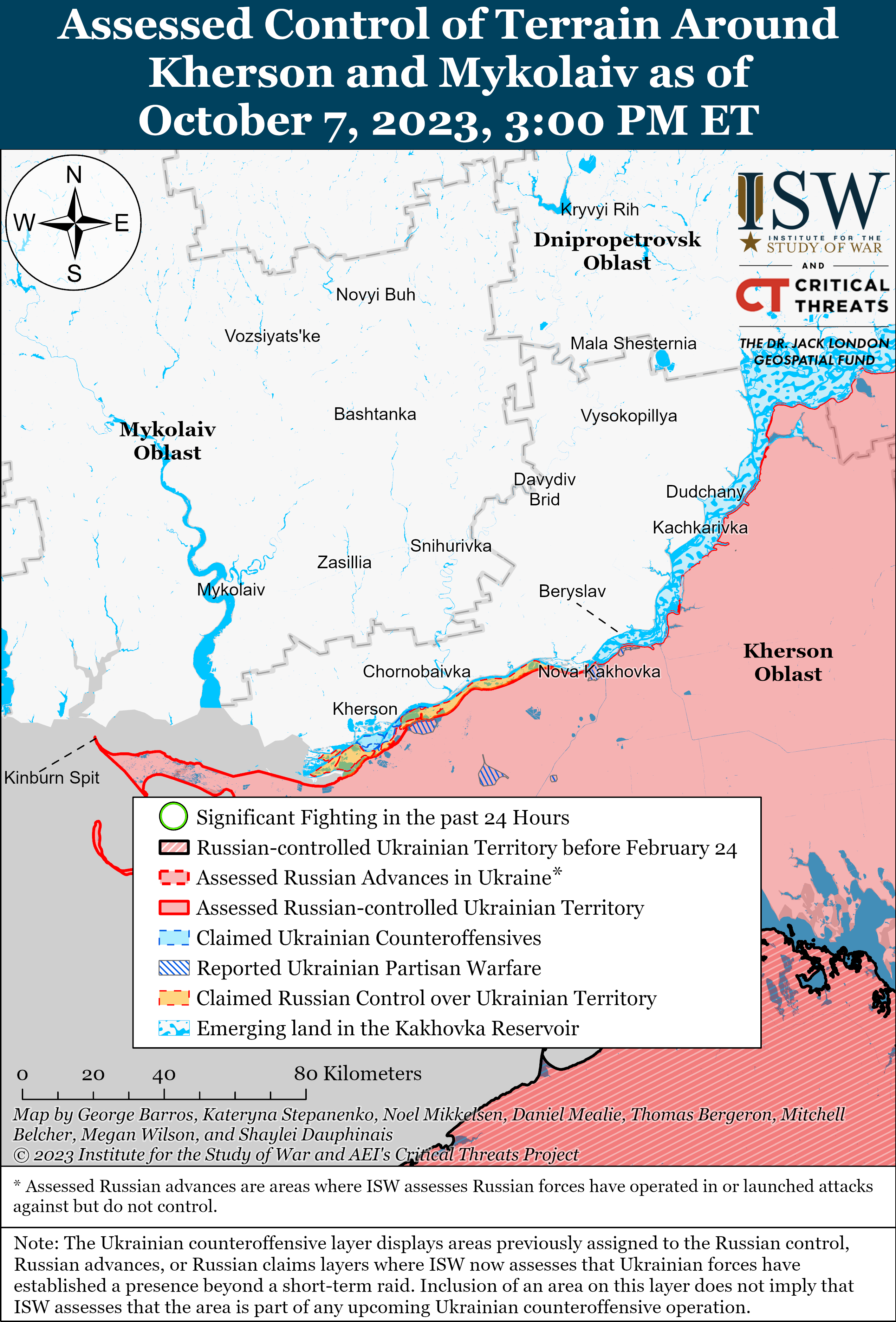
No comments:
Post a Comment